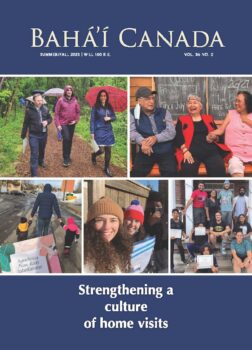Summer/Fall 2023 issue of Bahá’í Canada
In its 6 February 2023 message to unit conventions, the National Spiritual Assembly urged our “reflection on what is needed to strengthen a culture of home visits where meaningful conversations unfold, ties of spiritual kinship are forged, a sense of community is strengthened, faith is deepened, and plans are made.”
The letter goes on to describe the “role of the training institute in building capabilities that enable us to contribute to meaningful and uplifting conversation.” It continues: “Indeed, not only Book 2, but each of the books in the sequence seeks to build this capacity…”
Since then, the rich pattern of home visits throughout Canada has expanded and deepened. Home visits seem to actualize the concept of building unity articulated in the Bahá’í Writings.
This is the first issue of Bahá’í Canada since the joyous news contained in the Universal House of Justice’s Ridván message this year, that “a national House of Worship” is “to be raised up in Canada, in the vicinity of the long established National Hazíratu’l-Quds in Toronto.”
Through a review of materials in the Canadian Bahá’í Archives, the story “A history of Canada’s National Hazíratu’l-Quds and Mashriqu’l-Adhkar” was woven together, recounting the challenging and miraculous circumstances surrounding the National Assembly’s acquisition of the property for these institutions 70 years ago, guided by the Guardian.
Also in the “From the History” section, we go further back in time to explore the life of Ahmad of Yazd, who was the recipient of Bahá’u’lláh’s Tablet of Ahmad, recited by many in times of difficulty. After receiving the tablet and reflecting on its content, Ahmad travelled extensively, visiting the homes of many Babís to proclaim the coming of Bahá’u’lláh.
An article, previously published on bahaicanada.bahai.ca, describes the 73rd Bahá’í National Convention, which took place in May in Toronto, Ont., during which delegates completed their twin duties of electing the National Spiritual Assembly and consulting on the vision before Canada. Delegates, joined by two members of the Continental Board of Counsellors, studied the Ridván message, celebrated the achievements of the Canadian Bahá’í community, shared learning, and envisioned next steps.
In the National Assembly’s call to strengthen the culture of home visits, “where meaningful conversations unfold, ties of spiritual kinship are forged, a sense of community is strengthened, faith is deepened, and plans are made”, it asked “What elements of current culture—habits of thought and behaviour—may be obstacles to overcome?”
In the article “Home visits and social forces,” Michael Sabet uses elements of social theory put forward by philosopher Jürgen Habermas to reflect on elements of our current culture and articulate how the institute process shapes our exercise of free will. Through collectively building our capacity to carry out home visits, read reality, consult, and plan, we are influencing culture.
Social action initiatives have continued to emerge across the country, particularly in neighbourhoods where the institute process is gaining in strength. The article “Mental health workshops focus on youth” describes how concepts from the training institute—such as true friendship and service—were used to address mental health challenges among young people in Brampton, Ont. and Montreal, Que.
Among many goals of the Nine Year Plan, pioneering has once again come into focus—both internationally, as Canada has been assigned particular goals,[i] and on the homefront. In this issue, the first family to pioneer internationally during the Nine Year Plan describes how they decided to relocate to Tartu, Estonia. As more pioneers arrive at their posts, we hope to continue to share their stories as ties between clusters in Canada and those abroad strengthen through shared learning.
In reflecting on the bounty of raising up a National House of Worship at this time, we invite you to read the passages in the “From the Writings” section, which contains excerpts from the compilation The Institution of the Mashriqu’ l-Adhkar, prepared by the research department of the Universal House of Justice.
[i] Canada’s international goals include Belize, Bosnia-Herzegovina, Bulgaria, Denmark, Dominica, Estonia, Greenland, Japan, Latvia, Lebanon, the Leeward Islands, Lithuania, Morocco, and Tunisia.









